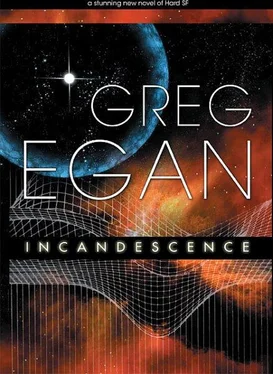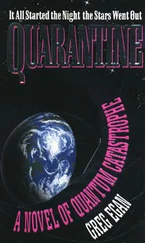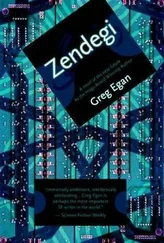The tunnel veered sharply, then opened up into a large chamber. At first all Rakesh could see was the far wall, thickly layered with fungus, but as they drew closer to the entrance the view took in the chamber's floor. Dozens, perhaps a hundred, creatures were moving through the fungus. They were each about a centimeter wide — ten times the size of the curious arthropod that had greeted them in the first Ark. Some had six legs, some had eight. The trunks of their bodies were flattened ovoids, encased in smooth, bilaterally segmented exoskeletons. Within, Rakesh could see small, pulsing organs pumping fluid through a series of cavities surrounding the other viscera, whose functions were less immediately apparent.
They stood at the mouth of the tunnel and observed the creatures in silence. Their motion seemed purposeful, systematic. After a while Parantham said, "They're not feeding on this stuff, but I think they're tending it."
Rakesh agreed. They were crushing some of the rarer plants with their claws, and doing the same to some much smaller animals living among the fungus, but they did not seem to be ingesting anything. They were favoring a handful of species, which were visibly flourishing under this attention, while killing what amounted to weeds and pests.
That didn't prove that they were sentient; agriculture was a fairly common form of innate symbiosis. Would such skilled genetic engineers as the Arkmakers have sentenced their descendants to toiling in the fields? Surely they could have devised maintenance-free crops. Was this proof that the genetic infrastructure had fallen into disrepair? Or perhaps the whole idea that this was a failure was cultural bias; perhaps for them this was enjoyable toil, as exhilarating as running could be for Rakesh's own phenotype.
Parantham said, "You see how they're drumming their legs against their torsos?"
"Yes."
"The vibrations are making it through the rock, so it could be a form of communication. I've been searching for correlations with their surroundings and behavior, but nothing's emerged so far."
"So either it's not communication at all," Rakesh concluded, "or it's playing a more sophisticated role than coordinating this task."
"It looks that way," Parantham agreed. "I was thinking that these might be domestic animals, engineered to tend the crops, but if they're talking to each other about matters far from the here and now, I would hope that means they're the farmers."
"What else could it mean?"
"They could be sentient, but enslaved in some fashion."
Rakesh was dismayed. "Where do you get these charming hypotheses?"
"It's been known to happen," Parantham replied dryly.
If the "farmers" had noticed their presence, there was no sign of it. Their avatars were a hundred times smaller than these creatures, and though they were culling pests barely larger than that out of the tangles of fungus, that was at close range. Rakesh couldn't help feeling that if he and Parantham wandered down into the cavern, their most likely reception would involve a similar treatment. In any case, trying to introduce themselves at this point would be premature; they needed to learn the creatures' language, if they had one, and determine exactly what could be expressed with it. Translating "we come in peace from another star" might be tricky if nobody in the Ark had braved the hard radiation of the exterior for several million years. It would be unwise to prejudge the matter, though; for all he knew these farmers could be passing their time debating cosmology and wondering whether life could exist outside the perfect conditions of the galactic bulge.
The two travelers continued to observe, patiently. Just as Rakesh was beginning to suspect that nothing was going to change however long they watched — there was no diurnal cycle here, after all — the farmers broke off traversing the crops and began milling toward the chamber's exits. None approached the tunnel where he and Parantham were standing; they were all heading in the opposite direction, deeper into the Ark.
Rakesh exchanged glances with Parantham; even with their unexpressive jelly-baby faces they didn't need to speak to confirm the decision. They switched on their thrusters and flew across the chamber. As they approached the far side the unspoken consensus continued; they flew together into one of the tunnels, then hovered in the middle to observe the exodus. The farmers jostled beneath them, crowding the small corridor, sometimes climbing the walls and ceiling to get past each other; with their claws splayed against the rock they seemed to have little trouble supporting their weight, but it could not have been entirely effortless as they weren't disregarding gravity completely. In the near vacuum and with no contact with the walls, Rakesh could no longer detect the vibrations of their putative language directly, but everyone in the torrent of bodies surging around him was visibly engaged in the drumming gesture, even more so than when they'd been among the crops. The creatures still showed no interest in the avatars; with the faint glow of the ion thrusters far outside the frequency range of the ambient light, they probably looked like nothing more than specks of dust thrown up by the stampede, and it would have taken an unlikely second or third glance for anyone to wonder why they weren't settling to the floor.
When the last of the farmers had surged past them, Rakesh and Parantham pursued the tail end of the crowd. When the tunnel forked, they split up. It was impossible to follow everyone, so Rakesh chose a group of five among his quarry who seemed to be sticking close together. One by one, though, in side tunnels and small chambers, each of the farmers dropped out of the group. They wedged their bodies into crevices in the rock, and simply stood there, dormant.
When Rakesh had no one left to follow he backtracked along the tunnels, not waiting for his avatar to meet up with Parantham's before filling her in on what he'd seen.
"The same here," she replied. "Perhaps the Arkmakers were constrained by a need for activity cycles in the ancestral biology, so they put in some internal, or social, cue to take the place of the diurnal triggers that would have been present on the home world."
"Sleep, glorious sleep," Rakesh rhapsodised. "These truly are my cousins."
Their avatars returned to the fork where they'd parted. "So is everyone dormant now," Rakesh wondered, "or is this night someone's day?" He was about to suggest that they go hunting for signs of activity when he saw two creatures, identical to the farmers, approaching along the tunnel where Parantham had just been.
They were moving quite briskly, but pausing now and then to scrutinize the tunnel wall. Looking for pests, like the farmers in the chamber? Or hunting for some particular food?
The pair stopped completely, and Rakesh flew closer to see what they were doing. One was scraping fungus from the wall with its claws, while the other opened up the side of its body and removed a small, detached sac or bladder full of dark fluid. The contents were not literally opaque, but came as close to it as anything Rakesh had seen so far.
When the first creature had finished cleaning the wall, the other one punched a hole in the bladder with the tip of one claw, and began squeezing the fluid on to the wall in a slow, painstaking fashion. As Rakesh manoeuvred himself into a better vantage point, he saw that a complex pattern of intersecting lines was already present, marked on the wall with a thinner, paler version of the bladder's dark contents. Line by line, this Arkdweller was repainting a faded sign.
Parantham caught up with him, then hovered beside him, watching in silence. When the signwriters had finished the two travelers remained, gazing at the strange symbols.
Читать дальше











